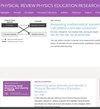专家与新手对物理问题难易程度的判断
Physical Review Special Topics-Physics Education Research
Pub Date : 2015-10-23
DOI:10.1103/PHYSREVSTPER.11.020128
引用次数: 25
摘要
学生有效备考的能力,或在考试期间管理时间的能力,与他们的元认知能力有关。先前的研究表明,学习和检索过程中元认知策略的有效使用与内容专业知识有关。学生还会对自己的学习情况和问题的难度做出判断,以指导自己的学习。本研究扩展了先前的研究,通过两个实验考察了新手和专家判断问题难度的能力的准确性;这里的“准确性”是指在力学物理入门课程中,学生对问题难度的判断与实际考试成绩是否相符。在第一个实验中,物理教育研究(PER)专家对物理入门题的难度进行了判断,并提供了其判断背后的基本原理。研究结果表明,专家使用许多不同的问题特征来预测问题的难度。虽然专家在判断问题难度方面相对准确,但他们在内容方面的专业知识可能会影响他们预测学生在某些问题上的表现。在第二个实验中,新手和“准专家”(研究生助教)从一组问题(取自真实考试)中判断哪个问题更难。结果表明,内容专业程度越高的学生对问题难度的判断越准确,这表明预测问题难度的能力是一种随经验发展的专业特征。本文章由计算机程序翻译,如有差异,请以英文原文为准。
Judgments of physics problem difficulty among experts and novices
Students’ ability to effectively study for an exam, or to manage their time during an exam, is related to their metacognitive capacity. Prior research has demonstrated the effective use of metacognitive strategies during learning and retrieval is related to content expertise. Students also make judgments of their own learning and of problem difficulty to guide their studying. This study extends prior research by investigating the accuracy of novices’ and experts’ ability to judge problem difficulty across two experiments; here “accuracy” refers to whether or not their judgments of problem difficulty corresponds with actual exam performance in an introductory mechanics physics course. In the first experiment, physics education research (PER) experts judged the difficulty of introductory physics problems and provided the rationales behind their judgments. Findings indicate that experts use a number of different problem features to make predictions of problem difficulty. While experts are relatively accurate in judging problem difficulty, their content expertise may interfere with their ability to predict student performance on some question types. In the second experiment novices and “near experts” (graduate TAs) judged which question from a problem pair (taken from a real exam) was more difficult. The results indicate that judgments of problem difficulty are more accurate for those with greater content expertise, suggesting that the ability to predict problem difficulty is a trait of expertise which develops with experience.
求助全文
通过发布文献求助,成功后即可免费获取论文全文。
去求助
来源期刊
自引率
0.00%
发文量
0
审稿时长
>12 weeks
期刊介绍:
Physical Review Special Topics - Physics Education Research (PRST-PER) is a peer reviewed electronic-only journal sponsored by The American Physical Society (APS), the American Association of Physics Teachers (AAPT) and the APS Forum on Education. The journal covers the full range of experimental and theoretical research on the teaching and/or learning of physics. PRST-PER is distributed without charge and financed by publication charges to the authors or to the authors" institutions. The criteria for acceptance of articles include the high scholarly and technical standards of our other Physical Review journals.

 求助内容:
求助内容: 应助结果提醒方式:
应助结果提醒方式:


